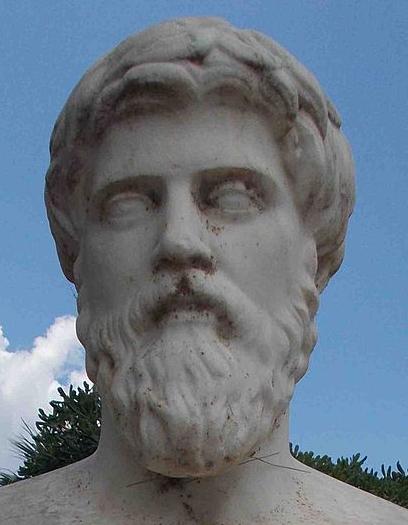Plutarch Berühmte Zitate
Moralia I, Vorschriften zur Gesundheit, 19
Zitate über Leben von Plutarch
„Der Anfang des rechten Lebens ist, wie wir glauben, das rechte Hören.“
Moralia I, Über das Zuhören, Kapitel 18 (Schlußsatz)
„Der Tod ist das Ende aller Dinge des menschlichen Lebens, nur des Aberglaubens nicht.“
Moralia II, Über den Aberglauben, Kapitel 4
Plutarch Zitate und Sprüche
„Wer wenig bedarf, der kommt nicht in die Lage, auf vieles verzichten zu müssen.“
Moralia VI, Von der Bezähmung des Zornes, 13 (461c)
Vergleichung Aristides und Cato d. Ä., Kapitel 4; sprichwörtlich als Armut ist keine Schande
Moralia I, Über das Zuhören, Kapitel 18
„Der Menge gefallen heißt den Weisen missfallen.“
Moralia I, Über die Erziehung der Kinder, Kapitel 9
„Die Kunst besteht darin, in allem den Mittelweg einzuhalten.“
Moralia I, Über die Erziehung der Kinder, Kapitel 9
„Dumm und feige ist, wer aus Furcht vor Verlust den Besitz des Nötigen ablehnt.“
Leben des Solon, Kapitel 7
„Ein lästiger und ungezogener Tischgenosse zerstört alle Lust.“
Gastmahl der Sieben Weisen, Kapitel 2, 147f
„Einsicht verschafft das Gute, erhält es, mehrt es und macht rechten Gebrauch davon.“
Trostschrift an Apollonius
Moralia I, p. 65D, Über den Schmeichler und den Freund, Kapitel 24 / über Medios
Königs- und Feldherrnsprüche / ein Spartaner zu einem Bettler
Plutarch: Zitate auf Englisch
31 Scilurus
Apophthegms of Kings and Great Commanders
“For water continually dropping will wear hard rocks hollow.”
Moralia, Of the Training of Children
Life of Alexander
Bartlett's Familiar Quotations, 10th ed. (1919)
“Athenodorus says hydrophobia, or water-dread, was first discovered in the time of Asclepiades.”
Symposiacs, book viii. Question IX
Bartlett's Familiar Quotations, 10th ed. (1919)
“And this," said Cæsar, "you know, young man, is more disagreeable for me to say than to do.”
Parallel Lives, Caesar
45 Antigonus I
Apophthegms of Kings and Great Commanders
41 Alexander
Apophthegms of Kings and Great Commanders
“Socrates said he was not an Athenian or a Greek, but a citizen of the world.”
Of Banishment
Bartlett's Familiar Quotations, 10th ed. (1919)
Variante: Socrates said he was not an Athenian or a Greek, but a citizen of the world.
“When one asked him what boys should learn, "That," said he, "which they shall use when men."”
Of Agesilaus the Great
Laconic Apophthegms
Of Agesilaus the Great
Laconic Apophthegms
Which are the most crafty, Water or Land Animals?, 7
Bartlett's Familiar Quotations, 10th ed. (1919)
Life of Pelopidas
Bartlett's Familiar Quotations, 10th ed. (1919)
“Cato the elder wondered how that city was preserved wherein a fish was sold for more than an ox.”
Cato the Elder
Roman Apophthegms
On the Tranquillity of the Mind
Bartlett's Familiar Quotations, 10th ed. (1919)
“Extraordinary rains pretty generally fall after great battles.”
Life of Caius Marius
Bartlett's Familiar Quotations, 10th ed. (1919)
“As Meander says, "For our mind is God;" and as Heraclitus, "Man's genius is a deity."”
Platonic Questions, i
Bartlett's Familiar Quotations, 10th ed. (1919)
49 Themistocles
Apophthegms of Kings and Great Commanders
“I will show," said Agesilaus, "that it is not the places that grace men, but men the places.”
Of Agesilaus the Great
Laconic Apophthegms
“A prating barber asked Archelaus how he would be trimmed. He answered, "In silence."”
33 Archelaus
Apophthegms of Kings and Great Commanders
On the Tranquillity of the Mind
Bartlett's Familiar Quotations, 10th ed. (1919)
“When the candles are out all women are fair.”
Conjugal Precepts
Moralia, Others
Of Fortune
Bartlett's Familiar Quotations, 10th ed. (1919)
Life of Demosthenes
Bartlett's Familiar Quotations, 10th ed. (1919)
Life of Marcellus
Bartlett's Familiar Quotations, 10th ed. (1919)
Of Man's Progress in Virtue
Bartlett's Familiar Quotations, 10th ed. (1919)
Life of Agesilaus II
Bartlett's Familiar Quotations, 10th ed. (1919)
